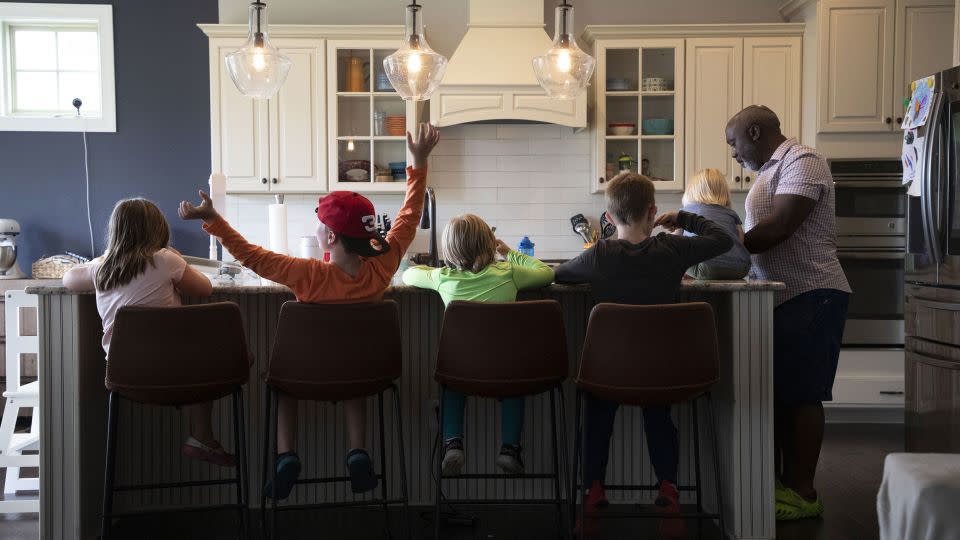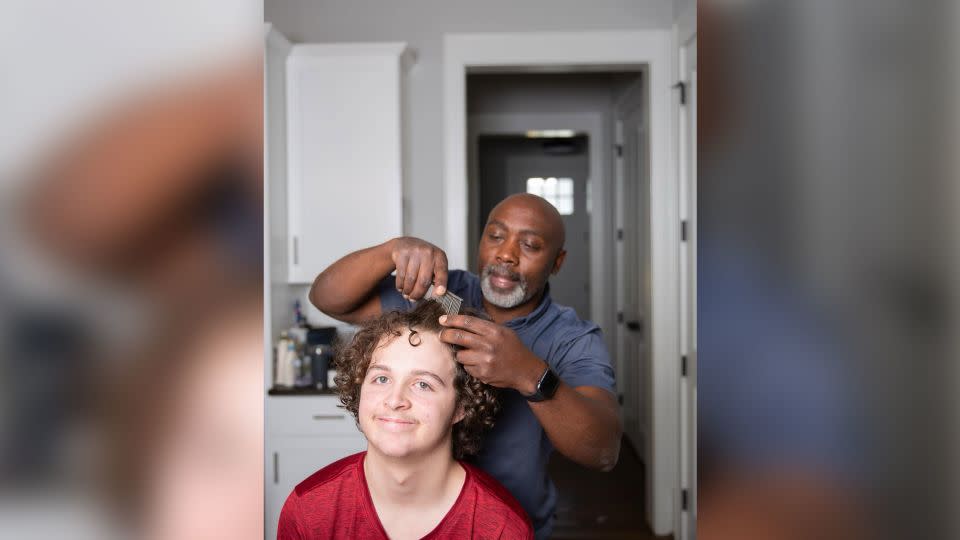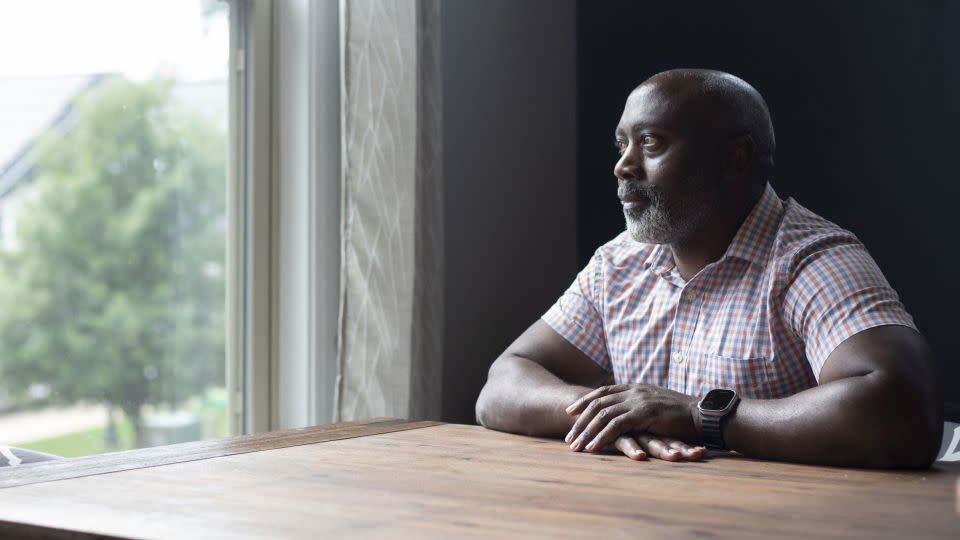As a boy he lived on the streets for years. Now he’s opened his home to kids as a single foster dad
The nervous 11-year-old showed up at Peter Mutabazi’s doorstep around 3 a.m., wearing blue pajamas and a gray Batman blanket over his shoulders. He carried a duffel bag holding a sweater, a pair of sneakers and not much else.
A social worker had called Mutabazi hours earlier to tell him about the boy, who had been abandoned at a hospital by his adopted parents and desperately needed a place to stay for the weekend.
It was January 2017. Mutabazi wasn’t ready to take in more kids – he had just said goodbye to two foster siblings and needed time to regroup. Then he remembered what it’s like to feel scared, alone and unwanted. As a boy he fled an abusive home and lived on the streets of Kampala, Uganda, before a stranger paid his high school tuition, leading to a college scholarship and an eventual move to the US.
“His adopted parents … never said goodbye or told him why,” said Mutabazi, who now lives in Charlotte, North Carolina. “So once I heard the story, I revisited my childhood running away. I was like, you know what? Bring him.”
Within minutes of his arrival, Anthony asked Mutabazi if he could call him dad.
“I said, ‘oh no, no, no. You’re just here for the weekend, so just call me Peter,’” Mutabazi says. But Anthony insisted. “He told me, ‘They said I can choose my dad since I’m 11 now, and I choose you.’”
Anthony, who had been in the foster care system since he was a toddler, never left Mutabazi’s house that weekend as planned. Mutabazi adopted him in November 2019 and gave him his last name.
Last month, Mutabazi adopted two more children: siblings who’d lived with him for three years. Isabella, 8, is the new boss of the house, he says, while Luke, 7, is a shy boy with a sweet smile.
Theirs is an unconventional family – he is Black, and his adopted kids are White – but Mutabazi, 49, believes that love transcends racial differences.
“I’m a girl dad now. Sometimes it feels surreal,” he says. “I look at them and I can’t believe that they are my kids, they have my last name. I can’t believe that this once homeless and hopeless person has now created this crazy family filled with love.”
He’s a rarity in the foster parent community
There were almost 400,000 children in foster care in the US in fiscal year 2021, according to the Department of Health and Human Services’ most recent statistics.
Mutabazi is not married and belongs to a rare group – federal data shows that only about 3% of foster parents are single men. And as an immigrant and a Black man, Mutabazi is part of an even smaller subset within the foster parent community.
Since becoming a foster father in 2016, he has hosted about three dozen kids of all races and cultures. Some of his foster children were reunited with their families, while others remain in his care.
Mutabazi shares glimpses of his life as a foster dad with his 328,000 followers on Instagram to encourage other men to be active fathers and signal that a healthy family is based on love, not skin color, he says.

He blurs the faces of his foster kids to maintain their privacy. But to mark Luke and Isabella’s adoption, he posted a video of them slowly removing their sunglasses and revealing their faces to his followers for the first time. After he signed the adoption papers, the family had a dance party.
Mutabazi currently has six kids in his home, including three foster children. His youngest foster child, who’s 2, is Luke and Isabella’s youngest sister.
His five-bedroom home is unlike most bachelor pads. It’s a chaotic mix of squealing kids and two energetic dogs, Simba and Rafiki. Stuffed animals sit on white bunkbeds. Squiggly colorings adorn the fridge, and rooms are scattered with toys.
Mutabazi says it’s not easy being a single dad and relies on a community of other foster parents to help. But he’d not have it any other way, he says. His afternoons and evenings are filled with school pickups, helping the kids with homework and teaching his now-teenage son how to drive.
He prepares most of the family meals and has introduced his adopted children to traditional African foods. One of their favorites is chapati, a tortilla-like flat bread popular in East Africa and India.
As a boy he survived on the street by carrying others’ groceries
In his 2022 book, “Now I Am Known: How a Street Kid Turned Foster Dad Found Acceptance and True Worth,” Mutabazi details how he ran away from home at age 10 to escape a physically abusive parent.
He lived on the streets of Kampala for five years and carried people’s groceries to their cars in exchange for money to buy food. At times, his only meal was a banana or an orange stolen from their shopping bags, he says.
Then one day, a stranger asked him his name. Young Peter was stunned because it was the first time anyone had done that in his years of living on the streets, he says. The man enrolled him in a boarding school and essentially became his foster father, he says.
Now Mutabazi says he wants to pay it forward by advocating for other children. He earned a bachelor’s degree in business administration at Makerere University in Kampala and later won a scholarship to study crisis management at Oak Hill College in London.
Two decades ago, he moved to Santa Clarita, California, to study theology at Master’s University. Since then he’s worked for child advocacy organizations, including Compassion International and World Vision US, where he now serves as a senior child advocate.
Instead of waiting for a spouse to start a family, Mutabazi decided to create his own – one that’s not defined by race or societal norms.
“It does not make sense to waste those years while waiting,” he says.
He gets questions from strangers as the adoptive father of White kids
Mutabazi says he does not choose the kids he fosters and has opened his home to White, Latino, Native American and African American children.
The related expenses can add up. In North Carolina, foster parents receive between $500 to $700 monthly per child depending on the child’s age, according to the group Fostering NC.
As the adoptive father of three White children, it’s not unusual for people to ask his kids where their parents are when they’re out in public, he says.
He recalled a recent incident when his children wanted to taste food samples at Costco.
“The lady said, ‘Hey, I cannot feed you until you go get your dad or your parents. My kids are like, ‘but he’s right here,’ ” he says. “I asked her, If I was White, would you have asked the same thing?’ She said no, because I see White families with Black kids every day.’”

Mutabazi says he carries paperwork to prove he’s their adopted father or foster parent everywhere he goes. He started doing that after people constantly called the police to report that they’ve seen a suspicious Black man with White children, he says.
He hopes to change the narrative of what adoptive parents look like, he says, offering examples of Angelina Jolie, Madonna and other famous people who’ve adopted African children.
“It’s considered natural for them, a noble cause,” while a Black man adopting White kids is seen as going against the system, he says.
Mutabazi hopes his story encourages men of all races to be present for the kids who need them.
He reminds his children over and over that they belong
Mutabazi says one of the biggest challenges he faces as a foster father is trying to explain to the children why their parents are not coming for them. It’s heartbreaking to see them lose the dream of going back to their families, he says.
“Not being able to say, ‘it’s going to be OK.’ When a child loses a mom or family member who’s still alive, and they ask you, ‘why can’t I see my mom?’, and you know the reason is – for example, drugs – and you can’t tell them, it’s hard. It’s pain you cannot carry for the child,” he says.
All he can do, he says, is create an environment where the children feel safe and loved. He tries to be there for them every step of the way.
Mutabazi says that overcoming his childhood trauma and becoming the father he wished he’d had is one of his biggest joys. He hopes it teaches his children that it’s OK to show your emotions and that they are loved unconditionally, even on their worst days.
“That is what I needed the most and no one ever did for me. I was never held. As a kid, affection was never given to me. All I thought about was survival, survival, survival,” he says.

He says he wants his children, who come to him with their own traumas, to just enjoy being kids.
One child psychiatrist says it’s crucial for foster parents to provide a stable environment and to fulfil the emotional needs of children under their care.
“Foster parents can help by providing a home that is safe and predictable. The value of this basic foundation cannot be underestimated,” says Fleisher, medical director of the Boston Child Study Center in Los Angeles.
At the same time, foster kids also need space to process feelings that they’re not ready to share, Fleisher says. “Successful foster parents provide love, emotional stability, patience, flexibility and use discipline as a tool for teaching, not shaming,” he says.
Transracial adoptions – when parents adopt a child of a different race or ethnicity – have significantly gone up in the past two decades, experts say.
Research on transracial adoptions shows that children of a different skin color than their parents can thrive in a loving home, Fleisher says. However, he notes, foster parents should consider incorporating cultural traditions and a social network from the community the child comes from. This is especially important for minority children who are fostered by White parents and need to learn how to navigate issues such as racism and other injustices.
To remind his children that they are loved, Mutabazi writes affirming words in places around the house, including the fridge and a closet.
“You are seen. You belong. You matter. You’re chosen. You’re not alone. You’re a gift. You’re loved,” these messages say. He’s also inscribed them on the bandanas that their dogs wear around their necks so that the kids can see them while they’re taking the dogs on walks.
Mutabazi recalls a recent incident when Simba peed on the carpet, leaving him sighing in frustration as he cleaned up the mess. Out of the corner of his eye, he noticed Anthony was watching him.
So he quickly checked himself and reassured Simba. He wanted to send a message to his son that nobody in the household – including the dogs – needed to be perfect to win his undying love and commitment.
Anthony listened, then chimed in.
“It’s OK Simba,” the teen told him. “You are loved. We are a family. You belong here.”
For more CNN news and newsletters create an account at CNN.com

